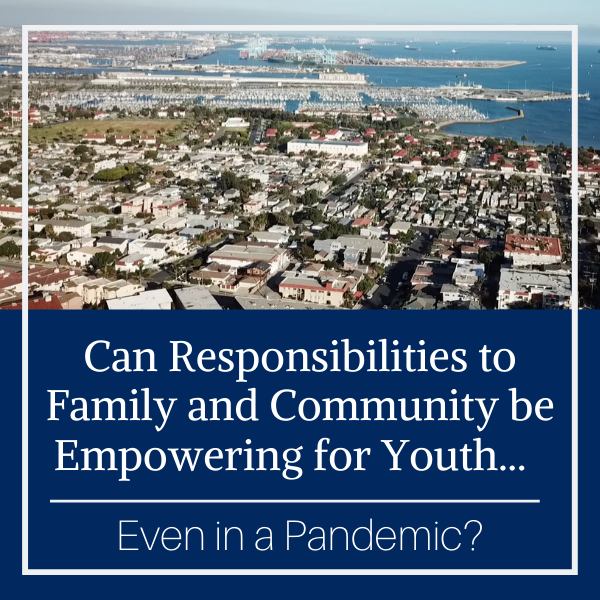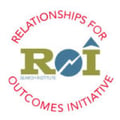Subscribe for Updates

By Ellen Bergstrom, Project Coordinator for the Relationships for Outcomes (ROI) Initiative
In early March, just before non-essential travel was cancelled and daily life in the U.S. changed dramatically with the COVID-19 pandemic, I traveled to San Pedro, California to visit Toberman Neighborhood Center, which joins with National Center for Families Learning as part of Search Institute’s Relationships for Outcomes (ROI) partnership (see box below). We were interviewing youth and parenting adults who had been part of a unique program to learn about strengthening their relationships through Keep Connected and through serving the community together through family service-learning.
Though located on the edge of Los Angeles, San Pedro is a low-income community with a small-town feel. The families, whom we interviewed in Spanish and English, spoke with pride and affection about their hardworking and close-knit community.
What struck me most, though, was the young people’s emerging realization of the important roles they play in their families and communities. They were clearly seeing the two-way street of being empowered and being responsible, and how they worked together.
It starts at home
That understanding started with their family relationships:
We talk about…how we can join more as a family and how we can support each other and help each other for anything that we need.
– 12 year old
For me, to get the trust of my mother was probably to get my grades higher. So she has a bit more expectations for me. She gives me more power when she knows that I am responsible to do it. When I was younger I really had bad grades. So she would not really trust me as much, until I started building up my grades, showing her that I can actually do it, and learn to take care of responsibility, and earn her trust. . . . .I know it was really hard for my mom because she was a single mother. I knew that I would have to do something to be more responsible, helping her around the house, doing good, and making sure that my brother and sister do too.
– 14 year old
I know my mom works really hard for us. So sometimes I just be like, ‘Mom, are you OK?’ Sometimes I just be like, “Oh mom, I miss you, I love you,” you know. Just a little, affection I guess. I hope that it makes her day or tries to build a stronger relationship.”
– 17 year old
I keep thinking about those young people and their families at Toberman Neighborhood Center. Since we met nearly 2 months ago, they have been sheltering at home along with much of the rest of the country in the midst of an international health crisis. I can only imagine how their responsibilities may have increased beyond what feels manageable. All family members now face new levels of uncertainty, stress, and financial strain.
I hope that the ways their family relationships were strengthened through Keep Connected and the commitments they made together make things a little easier. Maybe they will even help some families forge stronger bonds as they realize just how much they rely on each other. Maybe some of the other families they got to know in the group will be there for them too.
It grows into the community
I also suspect that the young people at Toberman are also much more aware of—and concerned about— what is happening in their community now because of their service-learning experience. When we talked right before the pandemic, they talked about how those experiences had changed them:
I thought it would be fun to do activities around the community. I remember one time we went to the beach to go clean it up. When I started cleaning up… it really changed how I saw things, because I never thought about how dirty it would get.
– 14 year old
They helped me by seeing more clearly what’s been happening in the community.
– 14 year old
One of the activities we have done is how to help the environment, or the community. If you guys don’t know, climate change is real. And the earth – we don’t have a second home. We just have this one. This program helped the community in a way because you connected people more to what’s going on.
– 17 year old
I have been following the news about how reduced commuting, air travel, and factory production during this pandemic has had dramatic effects on improving air pollution, including in Los Angeles. In the before and after pictures of smog cleared from view, we see in vivid ways how the small actions we all take every day can have a collective impact, in good or bad ways.
Uncovering the inequities
Another smoggy picture has been cleared by the pandemic: many layers of long-existing racial and socioeconomic inequities have been laid bare by this crisis. Beyond the coronavirus’s immediate impact on the physical health of people in different life circumstances and unequal access to health care, I can’t stop thinking about inequalities in education that impact families in communities like San Pedro. With schools closed and moved online, too many young people’s families don’t have food security, stable and safe housing, reliable internet access, or parenting adults who can be at home during the day.
As difficult as it is for me to work full time from home while also parenting two children who are out of school, I am acutely aware of the privilege I have to be able to do this. Most low-income workers are not eligible to work from home. In some families, not being able to work might mean a total loss of income if they are ineligible for unemployment benefits. In other families, essential workers may be busier than ever, while older children are left to take care of younger siblings, cook, clean, and run the household. I may wrestle with the challenges of helping my children with distance learning, but I think about parents who don’t speak English, aren’t familiar with technology, or don’t have an education degree like I do.
More equitable futures
So my most fervent hope is that we as a society will find ways to rebuild out of this health and economic crisis in ways that are more equitable. What would it look like for young people from all backgrounds and circumstances to truly have equitable opportunities to learn, grow, contribute, and pursue their dreams once it is safe for schools and programs to reopen?
With the barrage of terrible news in this pandemic, it can feel like we are all powerless. At the same time, the young people in San Pedro reminded me how much even small actions can make a big difference for others.
Right now so many of us are doing our best to keep each other safe and healthy by keeping our distance, washing our hands, and staying home. So many of us are doing our best to reach out from afar to check in with others, brighten someone’s day, provide some support, or be a listening ear. We’re doing our best to help the people we live with through our day to day responsibilities. These all seem like such small actions, but they all matter.
I hope that the young people in San Pedro and elsewhere recognize just how valuable their roles are—within their families, in our natural environment, and in our communities. They truly have the power to make a difference. Maybe, as the smog clears in this big pause from our previous routines, we will all realize just how much we rely on each other, and take our responsibilities to each other seriously. If we are really able to rise to the occasion, we will let young people have a leading role in defining a new, more equitable future as we move through and beyond this pandemic.
 National Center for Families Learning is one of five organizations that is part of Search Institute’s Relationships for Outcomes Initiative (ROI) partnership, which focuses on co-creating and testing innovative ways to strengthen developmental relationships that young people in marginalized communities experience. National Center for Families Learning selected Toberman Neighborhood Center as a local “design site” to take part in this project and learn lessons that may be applied to a broader network.
National Center for Families Learning is one of five organizations that is part of Search Institute’s Relationships for Outcomes Initiative (ROI) partnership, which focuses on co-creating and testing innovative ways to strengthen developmental relationships that young people in marginalized communities experience. National Center for Families Learning selected Toberman Neighborhood Center as a local “design site” to take part in this project and learn lessons that may be applied to a broader network.
Search Institute
3001 Broadway Street NE #310
Minneapolis, MN 55413
© 2021 Search Institute |
Search Institute is a 501(c)(3) nonprofit charitable corporation. All contributions are tax deductible.